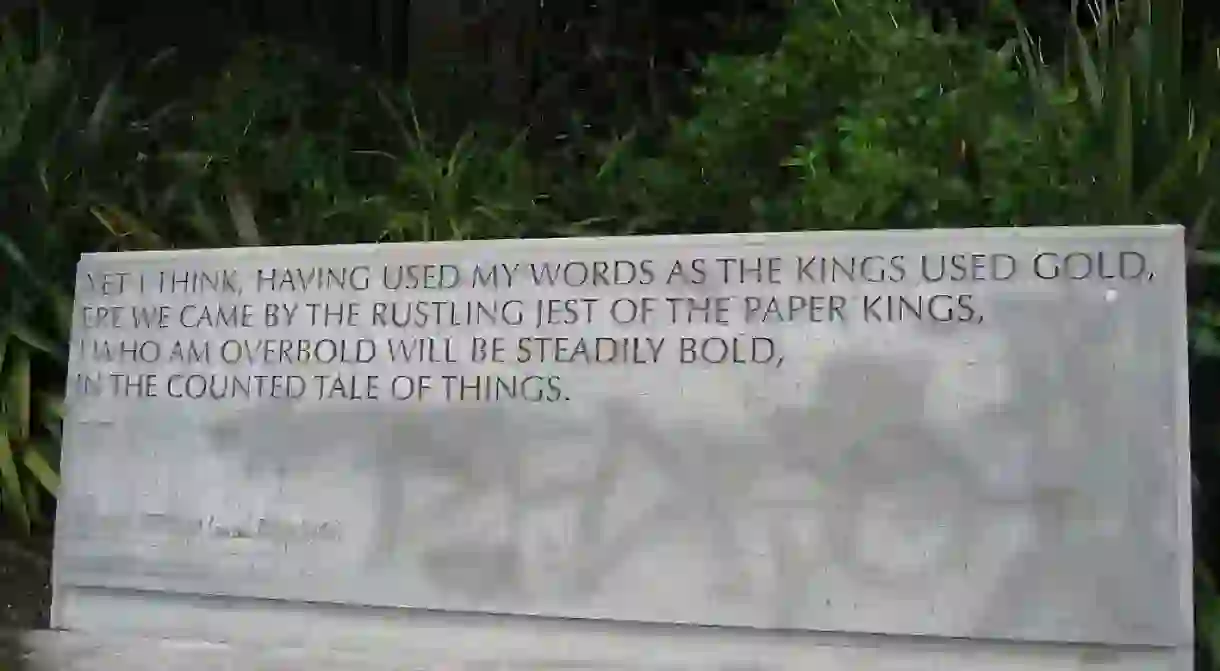New Zealand's 10 Most Important Poets

You can find many remarkable examples of New Zealand poetry throughout the country’s young history. These 10 poets are widely revered locally for their important contributions to the local literary scene, from their sharp criticism of the socio-political contexts that shaped their narratives to the historic depictions of the world they lived in.
Thomas Bracken (1841-1898)
Irish-born poet, journalist and politician Thomas Bracken is famous for writing the English version of New Zealand’s national anthem (God Defend New Zealand) as well as being the first person to use the phrase ‘God’s own country’ to describe the nation. Bracken migrated to Dunedin in 1869, where he worked for the Otago Guardian, among other local newspapers, before becoming a prolific poet. His work quickly became widely acclaimed in New Zealand and Australia; some of his best known collections include Musings in Maoriland and Lays and Lyrics: God’s Own Country and Other Poems (1893) and Flowers of the Freeland, Behind the Tomb and Other Poems (1871).

Blanche Baughan (1870-1958)
Blanche Baughan is widely regarded as the first New Zealand-European to write poetry of high distinction. She arrived from England in 1900 and her most famous poem, ‘A bush section’ (1908), portrays life in rural Hawke’s Bay with a sense of hope, a tinge of spirituality and stark sense of realism – particularly when it comes to showcasing the impact of the destruction of the surrounding bush to create new settlements.
Ursula Bethell (1874-1945)
Another important figure in early 20th century New Zealand poetry is Ursula Bethell. The English-born writer arrived in 1875 and spent a good deal of her life in Christchurch. Her forays into poetry only began when she was in her 50s; her most famous collection, entitled From a garden in the antipodes (1929), left a strong impact right from the outset. Her writings were largely inspired by her experiences living in Christchurch’s Cashmere hills; these days the city’s University of Canterbury has a writer’s residency programme named in Bethell’s honour.
James K Baxter (1926-1972)
James K Baxter is a widely celebrated figure in New Zealand – as much for his poetry as for his eccentric lifestyle and pointed criticism of the country’s social class system, political climate and race relations. In his short lifetime, Baxter penned an array of poems, plays and short story collections that made him one of the most prolific writers of his time. Some of his most famous books include Pig Island Letters (1966), Jerusalem Daybook (1971) and The Ballad of Calvary Street (1960).

Allen Curnow (1911-2001)
Allen Curnow was a poet and journalist who was as celebrated for his own poetry as he was for his wider contributions to New Zealand literature. His two most important poetry anthologies, A Book of New Zealand Verse 1923-1945 (1960) and The Penguin Book of New Zealand Verse (1960) sum up the country’s poetic endeavours while also providing some sharp criticism of the literary scene at large. These two books are considered landmarks in New Zealand literature – the 1960 publication in particular was the first significant literary piece from these shores to be published by Penguin.
Hone Tuwhare (1922-2008)
Hone Tuwhare was one of New Zealand’s most distinguished Maori writers, as well as being the first poet of Maori heritage to have his works published in English. His first collection, No Ordinary Sun (1964), was widely acclaimed upon release and has been reprinted 10 times over the following 30 years – in fact, it is one of the most widely read individual collections in the country’s literary history. Along with his influential writings, Tuwhare was also a key figure in Maori cultural and political activism in the 1970s, famously organising the first Maori Writers and Artists Conference in 1973 and participating in the historic Maori Land March of 1975, which was led by Dame Whina Cooper.

R.A.K. Mason (1905-1971)
Many literary critics, including Allen Curnow, regarded R.A.K Mason as New Zealand’s first ‘authentic’ poet. Mason was 19 when he first published his poetry; in fact, a good portion of one of his Collected Poems was created before he was 25. Naturally, his poems were marked by their intensity and youthful demeanour. Mason mysteriously stopped writing poetry in the 1940s, opting to work in left-wing theatre and as a communist newspaper editor for the remainder of his career.
A.R.D Fairburn (1904-1957)
A.R.D Fairburn was a prominent literary figure of the 1920s-1950s, publishing several poems, essays, criticism and reviews often centred around New Zealand’s intellectual life and wider socio-political issues. The three-part poem ‘Dominion’ is among his most celebrated pieces and draws upon the poet’s opinions and personal experiences to offer a stark, opinionated view of the economic, political and moral nature of New Zealand.

Robin Hyde (1906-1939)
Iris Guiver Wilkinson, better known by the pen name Robin Hyde, was a major novelist, poet and journalist who had a number of great achievements despite her short, tragic life. Her autobiographical novel The godwits fly (1938) and a series of autobiographical poems published in Houses by the Sea (1952) offer some insight into her early trials and tribulations. She spent much of her career working as a journalist and gained notoriety for her controversial, often socially charged interviews and newspaper columns. A knee injury meant she relied on opiates most of her life; Hyde died at the age of 33 after overdosing on Benzedrine.

Denis Glover (1912-1980)
Denis Glover was a poet and publisher best renowned for establishing the Caxton Press, a prominent publishing house that launched the careers of many New Zealand poets in the 1930s. The likes of Allen Cunrow, A.R.D. Fairburn and Robin Hyde have all had their poetry published by Caxton Press, for instance. Glover himself was acclaimed for the lyrical and at times witty qualities of his poetry, which appealed to wide range of readers. ‘The Magpies’ is his most famous poem and is considered to be a true New Zealand classic.













